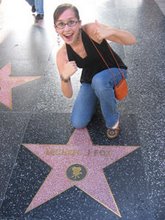Okay, so I should state upfront that I'm a Woody Allen neophyte. Of his films, I've seen What's Up Tiger Lily, Bananas, Sleeper, Match Point, and now, Midnight in Paris. So yeah, I missed all the good ones, I guess, except Match Point. I've been told that I struggle more than others with separating the artist from the art, and I admit that to be true. I do try, though. I mean, let's take Roman Polanski. Rosemary's Baby is incredible, then his pregnant wife gets murdered by the Manson family, then he makes this amazing and twisted adaptation of Macbeth, and I also love Chinatown and The Pianist, but the man is a confessed child rapist and I can never forget about that even when I'm watching and loving his films. So you'll have to forgive me when I say that I don't ever really seek out Woody Allen movies because he totally creeps me out.
Anyway, I was told Midnight in Paris was "delightful," and many of my friends "loved it" and saw it multiple times. I was pleasantly charmed by it, and found it a quick, whimsical journey through Paris across time (the film is only 100 minutes long, including credits). The story is sweet and has a clever conceit involving time travel that is forgiven any logic questions because that's not the point of the movie. Owen Wilson continues to surprise me as a pretty one-note actor who nonetheless brings a sort of honesty to his roles that really draws me in (he was the best part of How Do You Know, fwiw). All of the acting in the movie is really charming, with pitch-perfect roles played by Rachel McAdams as Wilson's fiancée, Kathy Bates as Gertrude Stein, Alison Pill as Zelda Fitzgerald, and Marion Cotillard as MPDG ingenue Adriana. My favorite cameo was probably Adrien Brody as Salvador Dalí. Allen gives us a sparkling, spotless Paris that is most beautiful in the rain, where a lost-in-his-thoughts wealthy American can wander the streets at midnight without encountering a single vagrant or having his wallet stolen.
The film is about nostalgia, and treats the subject in a cute, reflexive way. Owen's modern-day screenwriter is nostalgic for the golden age of writers and artists gallivanting around Paris in the 1920s. 1920s-era Adriana is nostalgic for her city's Belle Époque, whose denizens Gauguin and Toulouse-Lautrec (sidebar: the casting director couldn't find one LP actor in France?) wax romantic about the Renaissance. It's a good theme, because who among us hasn't sat and listened to a haunting Gershwin tune and wanted to wake up in the Jazz Age, or gotten transfixed by Seurat's Un dimanche après-midi à l'Île de la Grande Jatte - 1884 and wanted to just melt into it? I've spoken with some of my friends about our Austen-inspired idealization of Regency Era England, which lasts for about five minutes before we realize that as ethnic minorities and women, our lives would actually be pretty terrible were we to be transplanted to Pemberley by magic.
Wilson's character does make a brief concession to the fact that life is better in a world with antibiotics in it, and overall, I believe he realizes that one must learn to feel positively about the modern age, because nostalgia is fantasy. Surely Paris' 1920s beauty is tempered by the hindsight of knowing what horrors would befall Europe a decade and a half later. And here's where my thoughts on separating the artist from the art come back in. Our protagonist idolizes Hemingway, Fitzgerald, Picasso, Degas, and others. Misogynist, misogynist, womanizer, sadist, etc. And all mindblowing artists representative of their time. Obviously their portrayals are not realistic; they are conjured by Wilson's character as manifestations of what he knows he needs to remember in order to write a great novel.
Let me know what you think about Midnight in Paris. What historical era or work of fiction do you wish you could be transported to?
Thursday, June 9, 2011
Well, everyone knows Custer died at Little Bighorn. What this book presupposes is, maybe he didn't?
Labels:
Midnight in Paris,
Woody Allen
Subscribe to:
Post Comments (Atom)





No comments:
Post a Comment